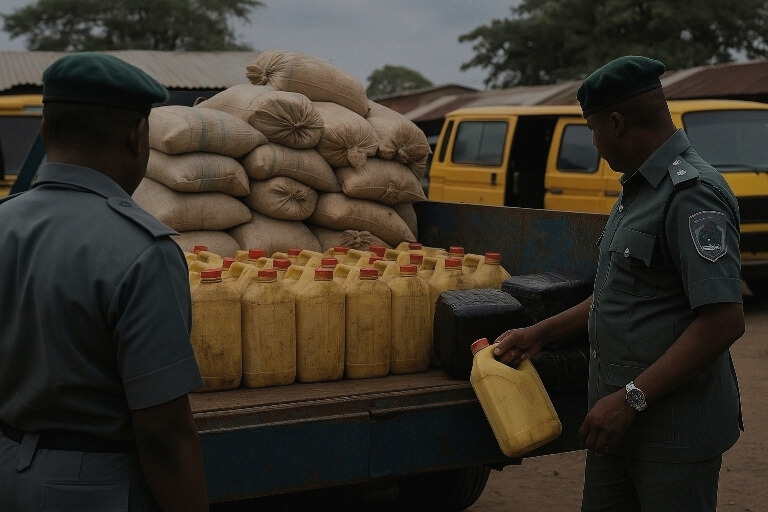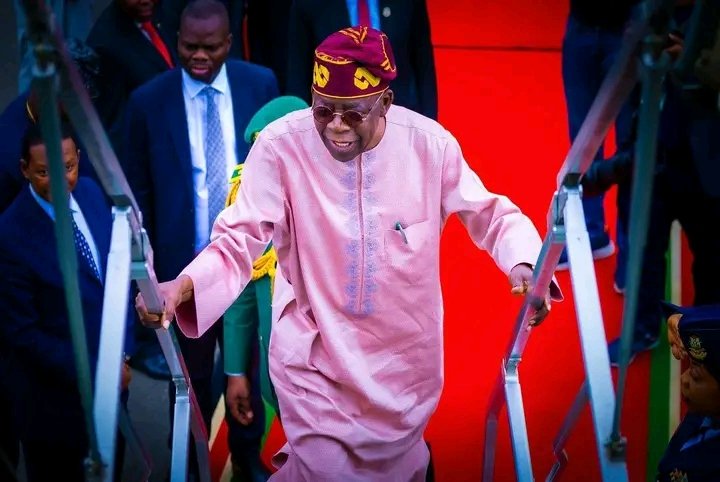
Customs intercept smuggled fuel, rice, and drugs worth millions along Nigeria’s key border corridors.
Fuel Smugglers Target Southwest Routes
Customs officials in the Federal Operations Unit Zone A announced the interception of over 54,000 litres of petrol along smuggling corridors in the Southwest, particularly near Seme and Idiroko.
The fuel, hidden in jerry cans and commercial vehicles, was allegedly bound for illegal export across Nigeria’s western borders.
“These smugglers disguise the shipments under cover materials and often operate at night,” said Acting Area Controller Hussein Ejibunu during a press briefing. “Our patrols are being intensified to block further diversion of subsidized fuel.”
The resale of Nigeria’s regulated petrol in neighbouring countries has become a lucrative business, as regional prices remain significantly higher. The government maintains that unchecked smuggling contributes to domestic fuel scarcity and fiscal leakage.
Smuggled Cannabis, Rice Seized at Seme
At the Seme border post, the Customs Command confiscated more than 2,800 bags of foreign parboiled rice concealed beneath scrap materials. The seizure, valued at over ₦900 million, came alongside arrests of suspects allegedly linked to organized trafficking rings.
Also Read: Farmer trampled to death as elephant strays from Ogun reserve
Authorities also recovered 67 parcels of cannabis sativa and multiple cartons of codeine-based cough syrup in the same operation. Customs officials stressed that smuggling now poses growing threats beyond economics, including health and internal security risks.
Customs Say Border Surveillance Strengthened
In northern Nigeria, similar activities have been reported. The Adamawa/Taraba Command revealed it intercepted 34,470 litres of petrol suspected to be en route to Cameroon through remote paths in Gembu and Mubi. Intelligence-sharing with security agencies contributed to the successful interception.
Comptroller Oladeji Adebisi, who oversees the command, said tighter surveillance is being maintained, especially in border communities susceptible to criminal infiltration. He noted an increase in unconventional smuggling routes used to avoid detection.
Calls for Reforms and Anti-Corruption Scrutiny
In the capital, lawmakers have expressed concerns over possible internal complicity in smuggling operations. The House Committee on Customs has opened a probe into the conduct of border officials following allegations of bribe-taking and misconduct.
“There is a need for accountability within the Service,” said a member of the committee. The inquiry is expected to cover operational transparency and the processes for handling seized goods and auctioning confiscated property.
Meanwhile, the Customs Comptroller-General, Adewale Adeniyi, emphasized that new technologies, including drone surveillance and satellite tracking, are being introduced to enhance border patrol capabilities. Trials are currently underway along the Nigeria-Benin axis and key northern entry points.
Economic Impact and Outlook
Experts warn that smuggling remains a critical threat to Nigeria’s economy, undermining revenue collection and contributing to inflation in sectors such as food and energy. Despite numerous seizures, enforcement agencies continue to face challenges due to limited manpower, corruption, and inadequate infrastructure.
The Customs Service has pledged to sustain its crackdown in coordination with other security agencies and community stakeholders. Officials believe that with technological integration and political will, smuggling can be significantly reduced in the coming months.

